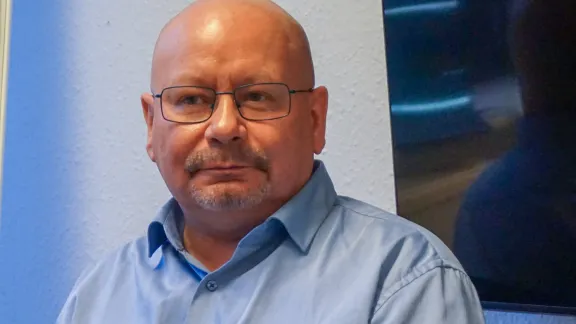The Assistant Archbishop of the Evangelical Lutheran Church of Russia, Rev. Dr Anton Tikhomirov, talks about theological education and the church’s current situation.

Rev. Dr Anton Tikhomirov has been Rector of the Theological Seminary of the Evangelical Lutheran Church of Russia since 2007 and Assistant Archbishop since June 2022. Photo: ELM
Forced “to become more independent”
(LWI) – “In our seminary, we want to do sound theology in a context of constantly new ecclesiastical, economic and political turmoil and challenges,” said Rev. Dr. Anton Tikhomirov about his work at the Theological Seminary of the Evangelical Lutheran Church of Russia in St. Petersburg, Russia. “Nowadays, it is also necessary to build bridges across hostilities. A good theological discussion should be an open, poignant but also a reconciling discussion.”
Tikhomirov has been Rector of the seminary since 2007 and Assistant Archbishop of the Evangelical Lutheran Church of Russia (ELCR) since June 2022. During a visit to partners in Germany, including the Evangelical Lutheran Mission in Lower Saxony (ELM), he spoke about the state of theological education and the situation of the Lutheran church in his country.
Online theological education
Currently, 40 students are studying at the theological seminary, and around a third are women. They come from various countries of the former Soviet Union: Russia, Georgia, Belarus, Moldova, Kazakhstan and four from Ukraine. “Theology can unite,” Tikhomirov is convinced.
The pastors’ training has been online since 2019, and Tikhomirov regularly travels to different regions, where meetings and seminars with students are organized. “Our students are often firmly connected to their places of residence or usually work there too. Studying online and choosing the pace of their studies accommodates their needs,” he said. The team of lecturers is international and interdenominational; the language of instruction is predominantly Russian. The course is designed as a three-year bachelor’s degree. However, it is only recognized within the Federation of Evangelical Lutheran Churches in Russia and Other States. “We are aiming for a state-recognized course, but that is proving difficult,” said Tikhomirov. That is partly due to the relationships between the various denominations and their respective recognition and classification by state authorities.
A minority church
Lutheran Christians are a tiny minority in Russia, with around 20,000 members spread over a vast area in the world’s largest country. “At the moment, we are trying to stabilize the church,” said the Assistant Archbishop, and “to strengthen cooperation between the two sub-churches of the ELCR”, the Evangelical Lutheran Church of European Russia (ELCER) and the Evangelical Lutheran Church of Ural Siberia Far East (ELCUSFO).
Following the start of Russia’s war against Ukraine, then Archbishop Dietrich Brauer left the country in March 2022 and stepped down from his office. In October 2022, Andrei Jamgarov was elected ELCER Bishop and installed on 6 November 2022, together with ELCR Archbishop Vladimir Provorov. After only a short term in office, Jamgarov died unexpectedly on 9 February 2023. Consequently, Sergei Goltsvert was elected as the new bishop in October 2023, and Tikhomirov became Provorov’s deputy.
According to Tikhomirov, one of the church leaders’ primary tasks now is to “calm the situation” and “advise against political actions.”
“We have a great shortage of pastors,” said Tikhomirov. The church leadership is particularly concerned about pastors’ availability in rural communities. Many pastors work part-time: Besides the parish ministry, they pursue other occupations to earn a living.
Limited sources of income are a concern, too. In large cities such as Moscow or St. Petersburg, parishes can use their prestigious buildings to generate funds for the congregation. “The Cathedral of St. Peter and Paul in Moscow, for example, is often rented out for cultural events. We also have a good organ there, and concerts are well attended,” reports Tikhomirov.
In addition, “measures such as the Western sanctions against Russia make it difficult or impossible for us to receive funds from abroad,” Tikhomirov noted. “This also affects the support from partner churches and organizations. This forces our church to become more independent.” That task is not easy, he said.
Tikhomirov saw a further challenge in the traditional decision-making processes of churches and their governing bodies, which require much time and consultation. “We need to become faster, and church leaders should be aware of developments and react accordingly. That will become increasingly important for the future well-being and sustainability of the church.


